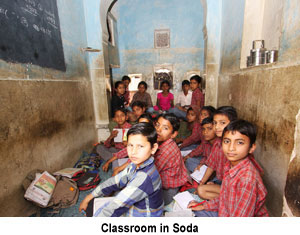
Chhavi Rajawat, Mayor (Sarpanch) of Soda, Rajasthan, India

FRONT PAGE
About us
 

MAYORS OF THE MONTH
In 2015
Mayor of Seoul, South Korea (04/2015)
Mayor of Rotterdam, Netherlands (03/2015)
Mayor of Houston, USA, (02/2015)
Mayor of Pristina, Kosovo (01/2015)
In 2014
Mayor of Warsaw, Poland, (12/2014)
Mayor of Wellington, New Zealand (10/2014)
Mayor of Sucre, Miranda, Venezuela (09/2014)
Mayor of Vienna, Austria (08/2014)
Mayor of Lampedusa, Italy (07/2014)
Mayor of Ghent, Belgium (06/2014)
Mayor of Montería, Colombia (05/2014)
Mayor of Liverpool, UK (04/2014)
Mayor of Pittsford Village, NY, USA (03/2014)
Mayor of Surabaya, Indonesia (02/2014)
Mayor of Santiago, Chile (01/2014)
In 2013
Mayor of Soda, India (12/2013)
Mayor of Zaragoza, Spain (11/2013)
Mayor of Marseille, France (10/2013)
Mayor of Schwäbisch Gmünd, Germany (09/2013)
Mayor of Detroit, USA (08/2013)
Mayor of Moore, USA (07/2013)
Mayor of Mexico City, Mexico (06/2013)
Mayor of Cape Town, South Africa (05/2013)
Mayor of Lima, Peru (04/2013)
Mayor of Salerno, Italy (03/2013)
Governor of Jakarta, Inbdonesia (02/2013)
Mayor of Rio de Janeiro, Brazil (01/2013)
In 2012
Mayor of Izmir, Turkey (12/2012)
Mayor of San Antonio, USA (11/2012)
Mayor of Thessaloniki, Greece (10/2012)
Mayor of London, UK (09/2012)
Mayor of New York, USA (08/2012)
Mayor of Bilbao, Spain (07/2012)
Mayor of Bogotá, Columbia (06/2012)
Mayor of Perth, Australia (05/2012)
Mayor of Mazatlán, Mexico (04/2012)
Mayor of Tel Aviv, Israel (03/2012)
Mayor of Surrey, Canada (02/2012)
Mayor of Osaka, Japan (01/2012)
In 2011
Mayor of Ljubljana, Slovenia (12/2011)
COUNTRY SECTIONS
Argentine Mayors
Belgian Mayors
Brazilian Mayors
British Mayors
Canadian Mayors
Chilean Mayors
Colombian Mayors
Czech Mayors
French Mayors
German Mayors
Italian Mayors
Japanese Mayors
Mexican Mayors
Spanish Mayors
US Mayors
Local government in the US

Worldwide | Elections | North America | Latin America | Europe | Asia | Africa |


 




 













|
|
Mayor of the Month for December 2013
Chhavi Rajawat
Village Mayor of Soda, India
By Tann vom Hove and Mayraj Fahim
5 December 2013: There was a sense of disbelief when a young woman dressed in jeans introduced herself to an international poverty conference at the United Nations in New York as the mayor of an Indian village in the backward State of Rajasthan. But any doubts about her credentials soon vanished when, in a passionate address, she challenged her audience to give up their privileged lives for one year and help her to achieve some of the UN Millennium Development Goals in her community. She reminded delegates that more than 70 per cent of Indians lived in villages and told them that if rural India continued to make progress at the same rate as it has done for the past 65 years, the country was doomed to failure. “But with your help we can fulfill people’s dreams about having water, electricity, toilets, schools and jobs.”
Some four years ago, while working for Indian telecommunication giant Bharti Airtel, Chhavi Rajawat was approached by 50 community elders from her home village of Soda and asked to run for sarpanch (village mayor) in the forthcoming elections. In a prioneering move, the State of Rajasthan had just decreed that half of all village mayors should be women. Soda was one of the state’s villages chosen to be led by a female mayor. The new rules were resented by many in a male-dominated society and the outgoing sarpanch thought to circumvent them by putting his wife forward as a candidate. But an influential group of villagers rose against the incumbent and turned to the family who, 20 years earlier, had given Soda its most famous leader.
 Chhavi Rajawat’s grandfather, the highly decorated General Raghubir Singh, served three terms as sarpanch and during his time in office encouraged women to come out from the shadows of their husbands, fathers or brothers. He supported women who resented being forced to wear veils in public and later sided with his granddaughter, who decided against the wishes of her parents to go to university and start a career rather than get married after college education. She said that thinking of her grandfather’s sense of duty during his military career and time as sarpanch of Soda convinced her to forego her corporate ambitions and run for mayor. Chhavi Rajawat won the elections, held in March 2010, against the wife of the incumbent sarpanch and another female candidate. Chhavi Rajawat’s grandfather, the highly decorated General Raghubir Singh, served three terms as sarpanch and during his time in office encouraged women to come out from the shadows of their husbands, fathers or brothers. He supported women who resented being forced to wear veils in public and later sided with his granddaughter, who decided against the wishes of her parents to go to university and start a career rather than get married after college education. She said that thinking of her grandfather’s sense of duty during his military career and time as sarpanch of Soda convinced her to forego her corporate ambitions and run for mayor. Chhavi Rajawat won the elections, held in March 2010, against the wife of the incumbent sarpanch and another female candidate.
Born in 1980 in Soda, Chhavi Rajawat was fortunate to have fairly well-off parents who paid for her to attend the Rishi Valley School in Andhra Pradesh, one of India’s most enlightened boarding schools. She later received a BA from Lady Shri Ram College, part of Delhi University and an MBA (Master of Business Administration) degree from Pune University. After her MBA, she worked for some of India’s best known companies including the Times of India, the Carson Group of hotels and, most recently, for Bharti Airtel. When asked why she gave up a promising business career to become mayor of a village in one of the poorest parts of India, Chhavi Rajawat said she didn’t want to disappoint the people, many of whom she had known since childhood. “I was privileged because of the education I received and I thought I needed to give something back.”
She added that becoming mayor was not something she dreamt about and admitted that without the provision that the new mayor should be a woman, nobody would have thought about her. Rajawat also wanted to justify the high regard her family is held in by many in Soda. She recounted that the delegation of elders, who first approached her, told her that since her grandfather’s time as sarpanch, the village had slipped backwards in terms of development.
Despite an increase in funding for rural communities, Soda was not making any progress. “In a country where more than 70 per cent of the population live in villages, much lip service is paid to rural development but many worthwhile schemes are not implemented or poorly executed.” Chhavi Rajawat believes that local government is the most disorganised sector in India.
In an interview, Chhavi Rajawat said that her country was totally unaware of what was happening at grassroot level. “The world is talking about India as a super power but that only applies to urban areas.” She suggested that every aspiring politician or civil servant should start working at village level.
On day one as mayor of Soda, Chhavi Rajawat realised the enormity of the task she had taken on. “There were so many challenges, I didn’t know where to start,” she recalled. Her immeadiate priority was to secure a long-term supply of potable water. Despite being in a drought area, Soda relies on rainfall for its water. Groundwater is not just natuarally contaminated but also extremely saline and is thus unsafe, even for irrigation. Rainwater is collected and stored in a number of reservoirs and ponds in Soda and neighbouring districts. But many are slowly silting up and need dredging.
Rajawat decided on a number of areas which she wanted to improve during her time as mayor. In addition to an accute shortage of drinking water, most houses lacked toilet facilities and electricity was only supplied for four hours during a 24-hour period. She also found that education was ruefully neglected, with high-school students only being taught in three subjects: Hindi, Sanskrit and geography. No maths, no science.
She is determined to improve the conditions for her villagers. Her priorities include, providing access to drinking water, reforestation, improved health services, education, alternate job opportunities, electricity and construction of proper roads in Soda. Realising that government finance for many projects was slow in forthcoming, Rajawat turned to the private sector for help.
 For example, when she approached the government for funding to dredge Soda’s largest reservoir before the onset of the rainy season she came up against a brick wall. She eventually received the money from her family, friends and other private sources. She has also started a campaign for donations to install 600 outside toilets. While her predecessor criticised her for making toilets a priority, the women of Soda are greatful to their sarpanch. “Chhavi listens to us. Now we don’t have to wait anymore until dark to relieve ourselves in the fields.” For example, when she approached the government for funding to dredge Soda’s largest reservoir before the onset of the rainy season she came up against a brick wall. She eventually received the money from her family, friends and other private sources. She has also started a campaign for donations to install 600 outside toilets. While her predecessor criticised her for making toilets a priority, the women of Soda are greatful to their sarpanch. “Chhavi listens to us. Now we don’t have to wait anymore until dark to relieve ourselves in the fields.”
Chhavi Rajawat has also teamed up with the German software company SAP to develop an internet portal for Soda, which will provide villagers with information on and access to a wide range of government services, including the provision of death, marriage and birth certificates as well as public funds. SAP will also set up a computer lab at Soda to foster basic computer literacy among the villagers.
The Soda sarpanch is also keen to promote virtual learning. At the moment teachers often teach several age groups together and, after the school building was destroyed during the last monsoon, do so in the open. Repairs to the school are delayed by bureaucracy and corruption. Again Chhavi Rajawat is trying to raise money privately to pay for construction materials and wages. She says too many civil servants are only too happy to postpone any decisions and resent her persistent pushing. “Government help is often decided by a number of departments, which leads to delays and corrupt practices.”
The Times of India, the country’s leading newspaper described Chhavi Rajawat as the changing face of rural India. She also received the Young Indian Leader award.
India’s village mayors are traditionally not affiliated to any party and Chhavi Rajawat has not yet indicated whether she wants to return to corporate life of go into politics after her time as sarpanch of Soda.
|
|

|































 Chhavi Rajawat’s grandfather, the highly decorated General Raghubir Singh, served three terms as sarpanch and during his time in office encouraged women to come out from the shadows of their husbands, fathers or brothers. He supported women who resented being forced to wear veils in public and later sided with his granddaughter, who decided against the wishes of her parents to go to university and start a career rather than get married after college education. She said that thinking of her grandfather’s sense of duty during his military career and time as sarpanch of Soda convinced her to forego her corporate ambitions and run for mayor. Chhavi Rajawat won the elections, held in March 2010, against the wife of the incumbent sarpanch and another female candidate.
Chhavi Rajawat’s grandfather, the highly decorated General Raghubir Singh, served three terms as sarpanch and during his time in office encouraged women to come out from the shadows of their husbands, fathers or brothers. He supported women who resented being forced to wear veils in public and later sided with his granddaughter, who decided against the wishes of her parents to go to university and start a career rather than get married after college education. She said that thinking of her grandfather’s sense of duty during his military career and time as sarpanch of Soda convinced her to forego her corporate ambitions and run for mayor. Chhavi Rajawat won the elections, held in March 2010, against the wife of the incumbent sarpanch and another female candidate. For example, when she approached the government for funding to dredge Soda’s largest reservoir before the onset of the rainy season she came up against a brick wall. She eventually received the money from her family, friends and other private sources. She has also started a campaign for donations to install 600 outside toilets. While her predecessor criticised her for making toilets a priority, the women of Soda are greatful to their sarpanch. “Chhavi listens to us. Now we don’t have to wait anymore until dark to relieve ourselves in the fields.”
For example, when she approached the government for funding to dredge Soda’s largest reservoir before the onset of the rainy season she came up against a brick wall. She eventually received the money from her family, friends and other private sources. She has also started a campaign for donations to install 600 outside toilets. While her predecessor criticised her for making toilets a priority, the women of Soda are greatful to their sarpanch. “Chhavi listens to us. Now we don’t have to wait anymore until dark to relieve ourselves in the fields.”